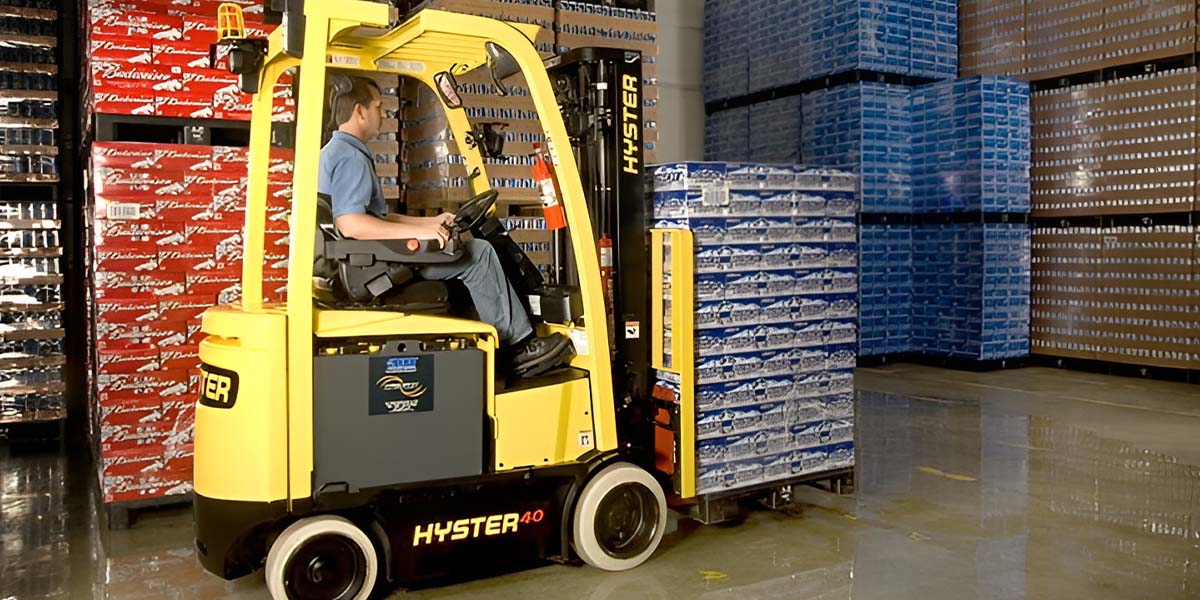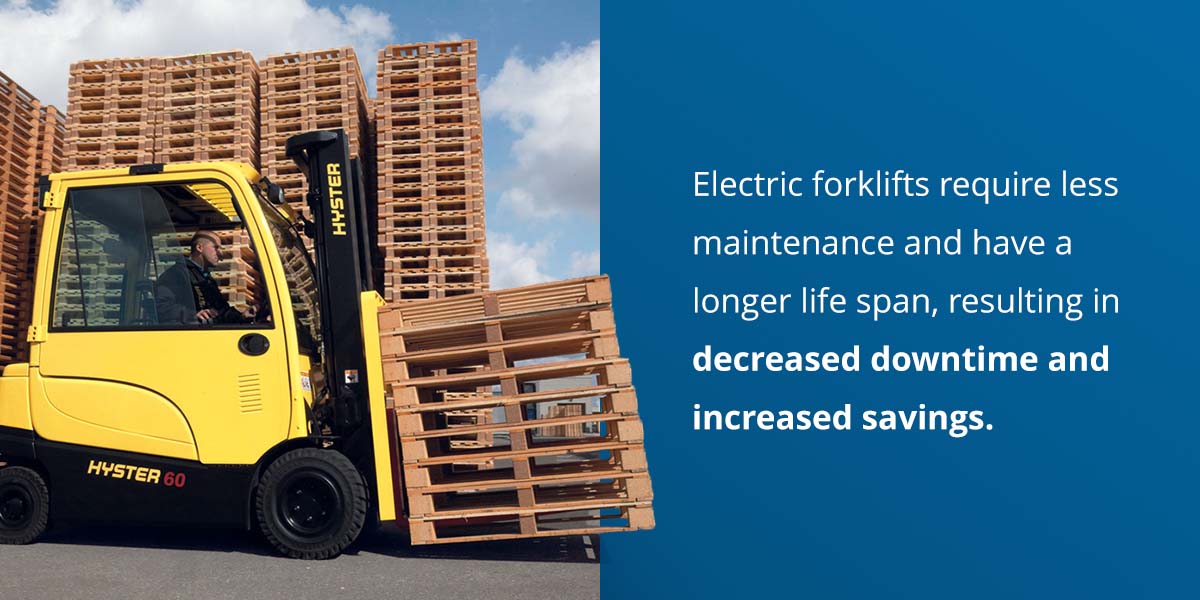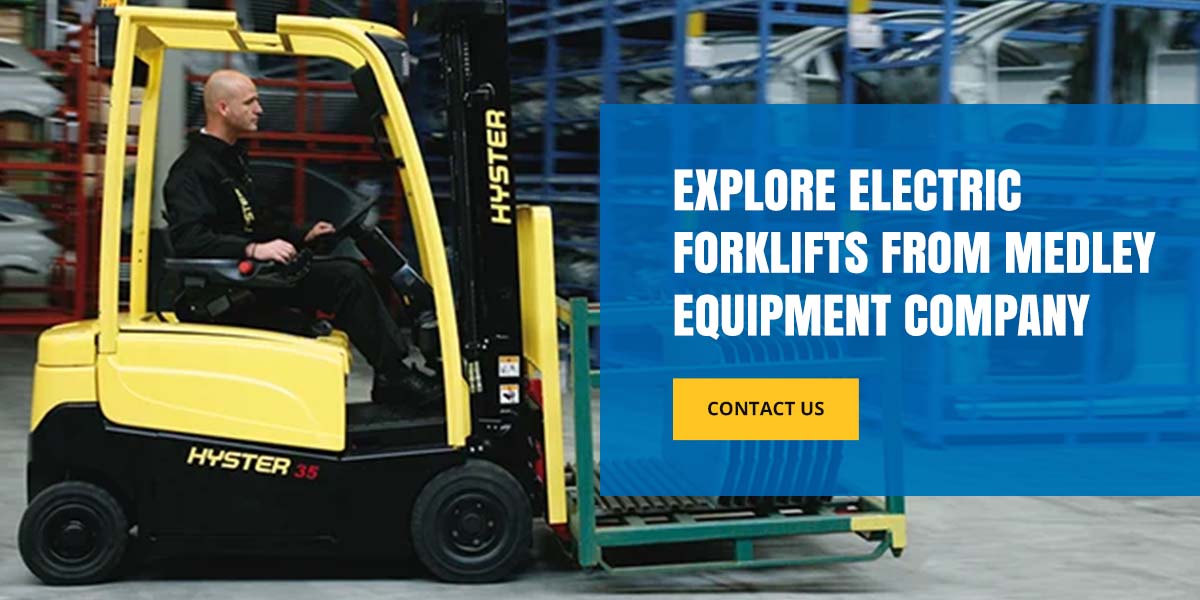
If you’re looking to add to your fleet of forklifts or replace an existing machine, you might consider electric forklifts instead of traditional equipment. Learn more about the benefits and drawbacks of this equipment, how they compare to gas-powered forklifts, and why you might want to buy an electric forklift.
What Is an Electric Forklift?
An electric forklift is powered by an electric motor and an industrial battery instead of an internal combustion engine. This equipment is used to lift and transport materials over relatively short distances, such as palletized goods in a warehouse or building materials across a construction site. Electric forklifts have many of the same applications as traditional forklifts but also have some unique considerations.
Pros of an Electric Forklift
Electric forklifts have several advantages over diesel, gas or propane forklifts. Here are some of the primary benefits:
- More sustainable: Electric forklifts produce no emissions, so they’re better for employee health and the planet. Compared to a diesel-powered forklift, an electric one can save 7 metric tons of CO2 annually. There’s minimal operation waste since you never have to change engine fluids. They are also safe to use around food products and pharmaceuticals.
- Safer to use: No emissions also mean electric forklifts are safer for employees to use, especially indoors. Additionally, companies don’t need to worry about storing or handling flammable fuel. Because electric motors are quieter than combustion engines, it’s easier for employees to hear each other, horns and other warning signals.
- Simple operations: Electric forklifts are easy to operate, with quick acceleration, even on inclines. They also tend to vibrate less than traditional models, making operating them more comfortable and less likely to cause operator fatigue. They generally have shorter wheelbases, so they’re easier to maneuver in tight spaces, such as the aisles between racking in warehouses.
Cons of an Electric Forklift
Although electric forklifts offer many benefits, there are also some disadvantages to consider:
- Higher initial cost: Electric forklifts cost more to purchase than a comparable model powered by gas, diesel or propane. You may also need to hire an electrician to install a charging station, adding to the cost. However, you basically pay for the fuel upfront with the battery, as electric forklifts generally have lower operating expenses and cost less over the life of the machine.
- Long charge time: Charging a battery is much slower than refilling a fuel tank — it can take up to 10 hours to go from a depleted battery to a full charge. Fortunately, some battery types have “opportunity charge” options that can top up the machines in five to 15 minutes. Other models may feature regenerative braking, which converts braking energy into electrical energy stored in the battery.
- Less versatility: Most electric forklifts are not well-suited for use outdoors or in wet environments. Some models have additional features like weatherproofing and all-terrain tires. Additionally, electric motors perform better in colder temperatures since they have few mechanical parts, making electric forklifts suitable for cold storage use, unlike forklifts with combustion engines.
Electric vs. Gas Forklifts
Both electric and gas-powered forklifts have their benefits.
Compared to gas forklifts, electric models offer:
- Few to no emissions during operation
- Improved operator comfort
- Lower operating costs
- Longer life span
Conversely, gas and other combustion engine forklifts are:
- Less expensive upfront
- Quick and easy to refuel
- Often capable of carrying heavier loads
- Suitable for outdoor use, including off-grid or remote locations

Electric Forklift Maintenance and Safety
Electric forklifts are safe and easy to maintain.
Maintaining an Electric Forklift
Because electric motors have fewer moving parts than combustion engines, electric forklifts require less maintenance and have a longer life span, resulting in decreased downtime and increased savings. However, there are still some maintenance tasks to perform regularly.
Before operating a forklift, check for leaks and loose parts. Inspect the following components:
- Attachments
- Battery
- Brakes
- Cables
- Hydraulics
- Safety features
- Tires
Follow all manufacturer’s instructions for charging and maintaining the batteries. Industrial batteries last for between 1,000 and 2,000 charging cycles or five years before they need to be replaced, though that depends on the battery type. The two main types of industrial batteries are lithium-ion and lead-acid.
Lithium-ion batteries can last up to five times longer than lead-acid batteries. Additionally, lithium batteries don’t require charge equalization or watering and can be reused in other applications once they can no longer power a forklift. In many cases, the ease of use and ability to repurpose them make lithium-ion batteries worth the investment.
While lead-acid batteries are less expensive upfront, they require more maintenance and don’t last as long. They are also less efficient than lithium batteries and use about 30% more electricity — lead-acid batteries are about 60% efficient, and lithium-ion batteries are up to 95% efficient.
Medley Equipment Company can assist with various services, including planned maintenance, fleet management, battery replacement and forklift tires.
Operating a Forklift Safely
With electric forklifts, operators should understand battery safety in addition to standard safety guidelines. Avoid over- or undercharging batteries, and only discharge to the manufacturer’s recommended level. For example, if the manufacturer recommends charging when the battery gets to 8%, operators should plug in the machine once the battery reaches that level. Teach operators to recognize low battery signs, such as slow starting and dim headlights. When it’s time to replace batteries, ensure you dispose of old ones properly.
As with all forklifts, you’ll want to familiarize your staff with the equipment’s safety features, including the lights, horn and emergency stop. Ensure all operators receive appropriate training on proper load handling, safe operation and emergency procedures. Medley Equipment Company brings the training to you to ensure your employees are OSHA-certified to operate the exact equipment in your facility or worksite.

Explore Electric Forklifts From Medley Equipment Company
When you’re ready to buy new or used electric forklifts, you can trust Medley Equipment Company. Since 1941, Medley has prioritized customer service. We want to be the right resource at the right time. Whether you need help determining which equipment suits your applications, replacement parts or training sessions, Medley Equipment will listen and make the process easy for you.
We sell, rent and service equipment across Oklahoma, Texas, New Mexico, Missouri and Arkansas. Explore our options online today, visit one of our locations or contact us if you have any questions.
